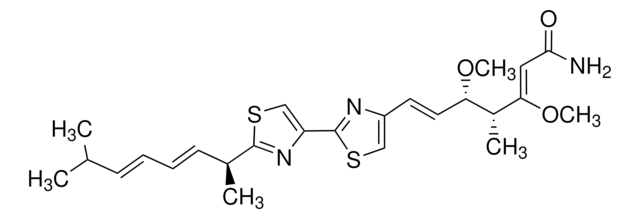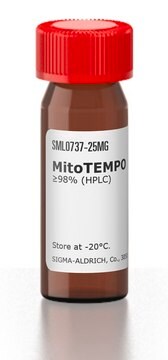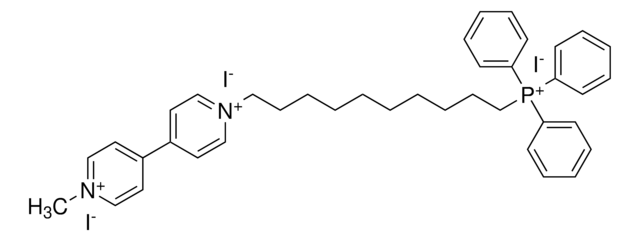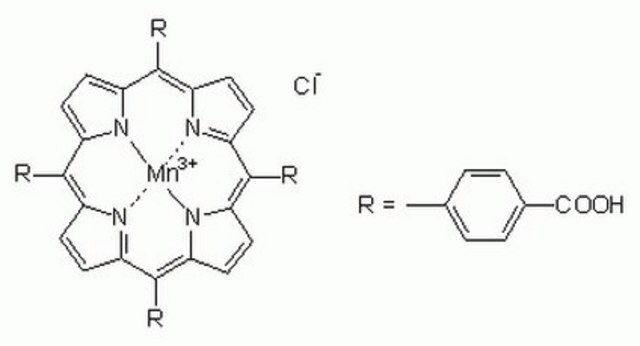SML1554
S3QEL 2
Sinónimos:
1-(3,4-Dimethylphenyl)-N,N-dipropyl-1H-pyrazolo[3,4-d]pyrimidin-4-amine
Iniciar sesiónpara Ver la Fijación de precios por contrato y de la organización
About This Item
Fórmula empírica (notación de Hill):
C19H25N5
Número de CAS:
Peso molecular:
323.44
Código UNSPSC:
12352200
NACRES:
NA.77
Productos recomendados
Formulario
powder
Nivel de calidad
color
white to beige
solubilidad
DMSO: 5 mg/mL, clear
temp. de almacenamiento
−20°C
Acciones bioquímicas o fisiológicas
S3QEL 2 is a selective inhibitor of superoxide production from the outer Q-binding site of mitochondrial respiratory complex site III (IIIQo) without altering oxidative phosphorylation.
S3QEL 2 is a selective inhibitor of superoxide production from the outer Q-binding site of mitochondrial respiratory complex site III (IIIQo) without altering oxidative phosphorylation. Site IIIQo is the primary source of mitochondrial reactive oxygen species (ROS) and has been implicated in a broad range of ROS-mediated signaling and pathology. S3QEL 2 lowered HIF-1α induction, protected against ROS-induced, JNK-mediated cell stress in pancreatic beta-cells, and decreased the oxidative stress-induced apoptosis that limits the yield of functional β-cells from intact islets.
S3QEL 2, a cell permeable substituted allopurinol, is also known as 1-(3,4-Dimethylphenyl)-N,N-dipropyl-1H-pyrazolo[3,4-d]pyrimidin-4-amine.
Código de clase de almacenamiento
11 - Combustible Solids
Clase de riesgo para el agua (WGK)
WGK 3
Punto de inflamabilidad (°F)
Not applicable
Punto de inflamabilidad (°C)
Not applicable
Elija entre una de las versiones más recientes:
Certificados de análisis (COA)
Lot/Batch Number
¿No ve la versión correcta?
Si necesita una versión concreta, puede buscar un certificado específico por el número de lote.
¿Ya tiene este producto?
Encuentre la documentación para los productos que ha comprado recientemente en la Biblioteca de documentos.
The Inhibitor Index: A Desk Reference on Enzyme Inhibitors, Receptor Antagonists, Drugs, Toxins, Poisons, Biologics, and Therapeutic Leads (2017)
Takujiro Homma et al.
Archives of biochemistry and biophysics, 700, 108775-108775 (2021-01-26)
Ferroptosis is a type of iron-dependent, non-apoptotic cell death, which is typically induced by cysteine starvation or by the inhibition of glutathione peroxidase 4 (GPX4) activity with the accompanying elevation in lipid peroxidation product levels. Despite the central role of
Remi Hatinguais et al.
Frontiers in immunology, 12, 641495-641495 (2021-04-13)
Reactive Oxygen Species (ROS) are highly reactive molecules that can induce oxidative stress. For instance, the oxidative burst of immune cells is well known for its ability to inhibit the growth of invading pathogens. However, ROS also mediate redox signalling
Nuestro equipo de científicos tiene experiencia en todas las áreas de investigación: Ciencias de la vida, Ciencia de los materiales, Síntesis química, Cromatografía, Analítica y muchas otras.
Póngase en contacto con el Servicio técnico








